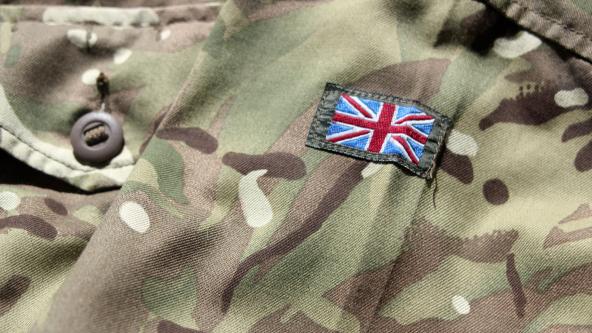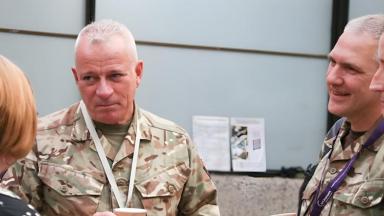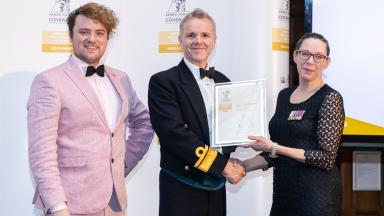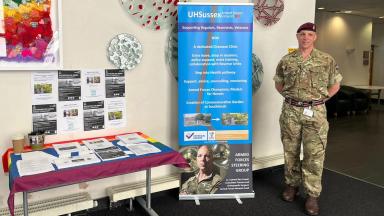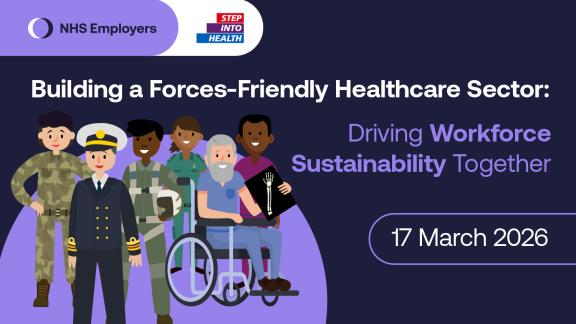About this toolkit
This toolkit is designed to assist all colleagues who have the responsibility of supporting Armed Forces reservists within the NHS. Its purpose is to provide practical guidance to NHS managers so they can establish a support framework specifically tailored for reservists in the workforce.
Reservists play a crucial role in both military and civil relief operations, and this toolkit aims to empower managers to create a positive workplace experience for them by fostering an inclusive and supportive environment.
How to to use this toolkit
Use the +chapters navigation menu at the bottom of your window or click on a chapter at the top of the page to explore the different sections of the toolkit.
HR guidelines and responsibilities
When a reservist joins your organisation
The Ministry of Defence (MoD) will inform the nominated line manager and Human Resources who is an Armed Forces reservist based on information that the reservist provides.
When a team member notifies you that they are a reservist, which is a legal requirement, it is recommended that you re-confirm their status with Human Resources and encourage the reservist to self-identify their reservist status on supplementary roles in Electronic Staff Record (ESR).
There may be certain repercussions if an individual does not notify their line manager or HR and they are either mobilised or on reservist activities and are unable to return to their role due to sustaining an injury or becoming unwell.
If a member of your team would like to become a reservist or are deciding which service they might join, it is important you are supportive of your employee's desire to do this.
You can signpost them to the Royal Navy, Army and Royal Air Force recruitment websites for further information. This guidance on the Defence Medical Services Reserves contains the relevant links and is a great place to start.
Having a reservist within your team can add tremendous value to your organisation. Through their training they will have access to funded professional courses. These help them improve transferable skills such as leadership and team working, and increase their resilience and ability to work under pressure.
Steps you can take to support your reservists
Providing a supportive work environment and publicly showing your commitment as an inclusive, forces-friendly employer helps to create a positive staff experience. There are various ways that organisations can demonstrate their commitment and provide ongoing support to reservists.
Sign the Armed Forces Covenant
The Armed Forces Covenant is a promise by the nation ensuring that those who serve or have served in the Armed Forces, and their families, are treated fairly and do not face disadvantage compared to their civilian counterparts. The covenant allows a more open and honest relationship between the MoD, members of the Armed Forces community and their employers.
See our Armed Forces Covenant pages for further details.
Create an Armed Forces policy
A key way to effectively support reservists is the creation of an Armed Forces policy for your organisation, as it demonstrates its commitment to supporting the Armed Forces community and will help to ensure that no member of the community is disadvantaged in the workplace or during recruitment due to their military status.
The easiest way to create an Armed Forces policy is to adapt an existing one. For example, you might include the Armed Forces community in your Special Leave policy. Alternatively, you can create a brand-new policy offering additional paid/unpaid annual leave to cover part or all of the mandatory training camp attended by reservists and Cadet Force Adult Volunteers.
Enter the Employer Recognition Scheme Awards
The Employer Recognition Scheme (ERS) Awards are run in partnership with the MoD and are a way for organisations to show their public commitment to supporting staff, patients and potential employees that are part of the Armed Forces community.
See our Employer Recognition Scheme page for further information and what is involved at each level of the awards.
Regional Employer Engagement Directors
Each region has a Regional Employer Engagement Director (REED) who is be an employer’s main source of contact with the Armed Forces and provides guidance as to how best fulfil your commitments to achieve the various levels of the ERS awards. REEDs are part of Defence Relationship Management and sit within the Reserve Forces and Cadets Association (RFCA). You can find the details of your REED here.
Appoint an Armed Forces Champion
Identifying an Armed Forces champion or a team of champions streamlines efforts to fulfil pledges made when signing the Armed Forces Covenant, gaining Employer Recognition Scheme Awards, or participating in Step into Health.
These champions coordinate internal and external activities related to the Armed Forces community, ensuring good practice and support throughout the organisation. Having a dedicated point of contact for Armed Forces employees fosters recognition, value, and feedback.
Anyone can be an Armed Forces champion, if they have an interest in supporting the Armed Forces community. Members of your HR team or those with a personal connection to the Armed Forces are well-suited for this role. Having a champion at the board level is crucial, as it facilitates the implementation of new policies and serves as an example for colleagues.
Many organisations opt for a collaborative approach by appointing multiple champions who share responsibilities. You could also consider having separate champions dedicated to veterans, service leavers, reservists, Cadet Force Adult Volunteers, and family members. This ensures comprehensive support across the many facets of the Armed Forces community.
The role of an Armed Forces Champion
Raising your forces-friendly profile
This may include arranging for your organisation to sign the Armed Forces Covenant, working towards ERS, Step into Health activity, organising events around national celebrations and liaising with your board.
Supporting your Armed Forces employees
Your champion may help create an Armed Forces policy, set up an internal network, be a point of contact for your Armed Forces employees and increase staff awareness of your Armed Forces agenda.
Engaging with other organisations
Your champion can liaise with other organisations that are working towards forces-friendly status, engage with your REED, liaise with charities and attend events including our regional networking sessions and annual Armed Forces conference.
Create an Armed Forces network
An Armed Forces staff network can help to make your Armed Forces community employees feel acknowledged and guide you on how to best offer your support. Your network might include individuals who have engaged with Step into Health, service leavers and veterans, reservists, Cadet Force Adult Volunteers, family members and any other individuals with an interest in the Armed Forces.
Key dates for supporting your Armed Forces community
Training commitments and mobilisation
Training commitments
All reservists, their nominated line manager and HR department will receive their training schedule a year in advance and if appropriate their liability for mobilisation or other periods of military service. This allows employers to take their reservists’ training commitments into consideration when planning shifts and managing their leave entitlements.
Ongoing training is an important part of a reservist's role. Training commitments vary depending on the service but are usually between 19 and 27 days per year. This training usually takes place on evenings and weekends, in addition to a two-week annual camp (ACT).
The training that reservist receive is rigorous and world class and can be hugely beneficial to their civilian role and your organisation. The sessions can include team building, leadership training courses such as Advanced Trauma Life Support (ATLS) and Major Incident Medical Management and Support (MIMMS).
Two-week annual camp
Each year a reservist will be required to participate in their unit's annual camp, where the whole unit will take part in training exercises either in the UK or abroad depending on the type of training that is being delivered. Reservists can also use this two-week period to complete an individual academic course. In recognition of the value gained from training, many employers provide additional paid or unpaid leave, with the balance being made up from a reservist’s spare time.
Mobilisation and deployment
Mobilisation is the process of calling reservists into full-time service and covers the period of pre-deployment training (PDT), the operational tour and post-operational tour leave (POTL).
When your reservist is called up you will receive:
-
a copy of the call-out notice
-
notification of the date and likely duration of the mobilisation
-
details of the employer's and reservist's statutory rights and obligations
-
information about exemption and deferral
-
information on financial assistance.
Keeping in touch
When reservists are deployed on operational tour, they can often feel isolated and separate from their civilian life. To help keep them integrated with the organisation, you may want to explore ways to keep in touch, prior to mobilisation. This could be by emailing organisational newsletters, having regular telephone calls or sending parcels to their base, depending on the individual’s preference.
It may also be helpful to share the reservist’s experiences while they are deployed. Think about asking them to write a blog about their experiences so this can be shared with the team and more widely via your intranet. This would need to be cleared through their Commanding Officer.
Your reservist’s absence may also have an impact on your team, so it is important to keep in touch with them. Ask how they are feeling since the reservist left and make sure the new staffing model is working.
Financial assistance
Employers can apply for financial assistance when a reservist is mobilised. The MoD offers this support so that employers can be fully or partially reimbursed for the costs incurred during this time.
The MoD will also pay for their pension contributions while they are away from work. It is important to make sure their terms and conditions have been transferred to the MoD after deployment.
Assistance with financial support claims when a reservist has been mobilised includes:
the cost of a temporary replacement if it’s more than the reservist’s salary; you may be able to claim up to £110 a day per reservist mobilised
advertising costs and agency fees for finding a temporary replacement
five days' handover before and after mobilisation
75 per cent of the cost of specialist clothing for the person providing cover (up to £300)
up to £2,000 training costs for the person providing cover
overtime, if other employees cover the reservists' work
any training the reservist needs when they return to work.
Returning to work
Returning from deployment
When returning from deployment your employee has an obligation to inform you of the date they wish to return to work - no later than the third Monday after their last day of service. If they want to return to work before the end of their leave period, they must get permission from either their Commanding Officer or the demobilisation centre.
You are required to offer your employee the same type of job they were doing before, with the same terms and conditions. If the job no longer exists, you must look for a reasonable alternative.
It is important to have an ongoing conversation with your returning reservist to uncover any personal issues. While on operational tour, the Armed Forces will take care of day-to-day tasks such as cooking and getting to work so it may take a while for them to adapt to civilian life and additional adjustments could help during this time.
As well as physical health, be mindful of their emotional wellbeing. Keep in mind they may be returning to a very different environment which could be a significant culture shock. Settling back into civilian life can take time and it is important to be patient.
To help support your staff member, you can use our health and wellbeing resources. These resources advise on physical, emotional and mental wellbeing for all NHS staff and provide advice and guidance on a variety of themes including stress, sickness absence and financial wellbeing.

